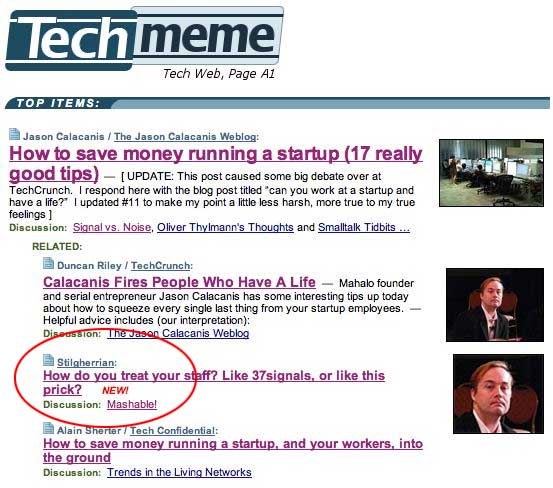In the context of our on-going argument, it’s refreshing to stumble across the observation that bigger isn’t always better for business. “Americans think big. This has helped make them the most powerful nation on Earth, but bigger is not always better, either for our bodies or, I suggest, for our organizations. If I were to visit a symphony orchestra and ask them about their growth plans for the future, how would they respond? They would talk about their plans to extend their repertoire and to bring their work to new audiences, not about increasing the number of violinists… Why does almost every business that I know seek to grow in size, year after year, in fact, as if there were no limit? Why can’t they be content with doing more with less?” (Hat-tip to Signal vs Noise.)
A Pause in the Jason Calacanis discussion
A note for folks stumbling across this website thanks to the Jason Calacanis / 37signals / TechCrunch discussion: It’s 4.30pm on a sunny autumn Sunday afternoon here in Sydney. I have been writing a further post which explains, amongst other things, that I’m not trolling (deliberately stirring up controversy), but passionately arguing a genuine concern. I’m amused this has turned into a global controversy, flattered even, when I reckon it’s more a storm in a teacup — though at its heart is a fundamental issue about how we do business. However for the next few hours I’ll be enjoying the remaining sunshine, doing some shopping and generally spending Sunday evening with my beloved. More soon.
Well, I wanted some profile before Australia 2020…
[Update 10 March, 1030 AEDT: I’ve written a follow-up article which, while bound to piss off a few people, explains precisely why I’m so concerned about this issue.]
…but I don’t know whether this was exactly what I had in mind. Calling a high-profile Internet entrepreneur a prick, and then being referenced by some of the highest-traffic tech blogs on the planet.

OK, I participated in the discussion at TechCrunch and the 37signals blog Signal vs Noise, as I should. But then it was picked up by Mashable and then TechMeme (see screenshot). And now I’m seeing inbound from TechCrunch Japan and Colbert Low’s technology blog and who knows where else to come.
Continue reading “Well, I wanted some profile before Australia 2020…”
How do you treat your staff? Like 37signals, or like this prick?
[Update 10 March, 1030 AEDT: I’ve written a follow-up article which, while bound to piss off a few people, explains precisely why I’m so concerned about this issue. There’s also my first follow-up, written on the weekend.]
“Chalk and cheese” is how I’d describe two approaches to staff management I stumbled across this week. One treats staff as trusted contributors to a shared enterprise, the other as disposable work-droids from which you squeeze every last effort.
Jason Calacanis (pictured) has started various firms, including Mahalo, a “human-powered search engine”. (Don’t worry, I’d never heard of it either.) In How to save money running a startup (17 really good tips) there are some good tips — like outsourcing accounting and worrying more about good chairs than tables. But to paraphrase the bad ones:
- Hold meetings at lunchtime so people never get a mental break from work.
- Don’t provide phones so staff have to use their own.
- If someone shows signs of working hard, buy them a computer for home so they end up working nights and weekends too.
- Buy a good coffee machine — not because you’d like to give your employees good coffee, but to prevent them “wasting time” getting it from a nearby barista.
But that’s not the worst…
Continue reading “How do you treat your staff? Like 37signals, or like this prick?”
5 marketing lessons from Houdini
37signals posted an excellent summary of Five marketing/business lessons from Harry Houdini: focus on the killer bit; judo big problems into small ones; beat copycats by innovating; give ’em a story; free samples build buzz. Worth a read.

